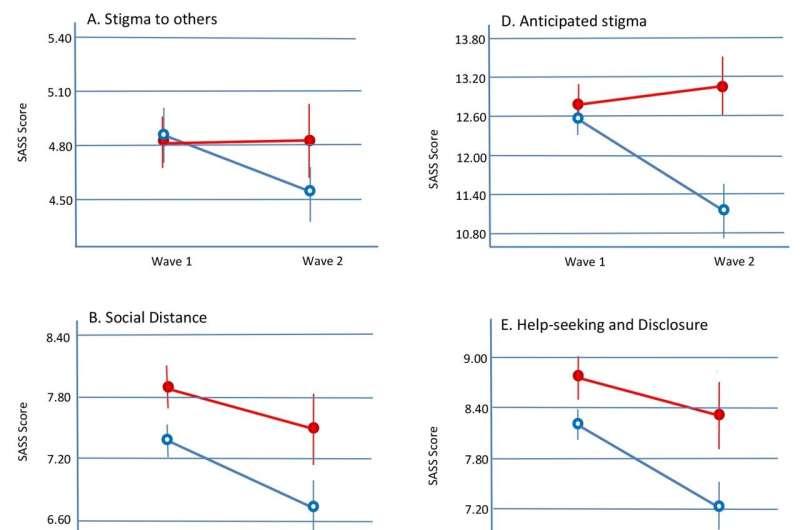This article has been reviewed according to Science X's editorial process and policies. Editors have highlighted the following attributes while ensuring the content's credibility:
fact-checked
peer-reviewed publication
trusted source
proofread
Training staff on low intensity psychological interventions for mental health conditions can cut workplace sickness

Improving a workforce's understanding of treatment strategies for mental health problems can significantly reduce staff sickness as well as encourage people to ask for support, according to new research.
Psychologists at Swansea University and Cardiff University have revealed that implementing a special intervention program among a group of staff at the DVLA led to a 22 percent drop in recorded sick days.
Mental health difficulties, such as stress, account for a large proportion of work absences. Many people may be needlessly embarrassed or ashamed of their mental health problems so either do not seek help or report that they have a physical health problem instead.
The research team devised a workplace intervention program called Prevail to help people cope with their problems and reduce stigma. Priorities for improvement were common conditions experienced by many—depression, anxiety, stress, and distress caused by bereavement, divorce, debt, housing problems or friendship issues.
The researchers then conducted a randomized control trial to evaluate the impact of Prevail on staff at the Swansea-based government agency. Their findings have just been published in BMC Public Health.
Rather than identifying staff who may need help, Prevail aims to give all employees training on psychological interventions and coping techniques they can use if they experience mental health problems themselves and also how they can recognize and better understand if colleagues, friends or family have issues. Through this, the program also addresses unnecessary stigma surrounding mental health.
DVLA staff and managers involved in the study were divided into two groups—one taking part in sessions delivered by specially trained colleagues which taught psychological techniques for treatment of common mental health conditions and basic mental health literacy. The other (control) group did not attend the sessions.
Analysis following the trial showed that Prevail had been well received and had reduced stigma related to mental health problems. Also, the number of sick days taken was reduced by around 22 percent in those that took part in the program while there was an increase in the number of sick days taken by the group that did not receive the intervention training.
Professor Nicola Gray, from the School of Psychology at Swansea University, said, "Mental health problems are often hidden and therefore get worse over time without effective intervention. Prevail teaches people evidence-based psychological techniques for the treatment and management of these conditions. It also aims to reduce stigma by providing evidence that these problems are common and can happen to anyone. People who are struggling should seek appropriate help, just like they would if they had flu or a broken leg."
Head of HR at the DVLA Helen Davies said, "The DVLA is committed to helping its workforce to be healthy and happy. Our investment in developing the Prevail program to help promote better mental health in our workforce has been worthwhile and many staff have commented on how Prevail has helped them overcome their mental health difficulties, and even helped them to help other people by teaching them the techniques they have learnt."
Professor Robert Snowden, from Cardiff University, added, "We are delighted that Prevail has been shown to be effective. We hope that other organizations will also want to support their workforce within the area of mental health, and support them to learn evidence-based techniques to improve emotional functioning and mental well-being."
Now the team hopes this research will help inform other major employers and that it will have a long-term impact on how they care for and support their staff.
More information: Nicola S. Gray et al, Reducing sickness absence and stigma due to mental health difficulties: a randomised control treatment trial (RCT) of a low intensity psychological intervention and stigma reduction programme for common mental disorder (Prevail), BMC Public Health (2023). DOI: 10.1186/s12889-023-16200-x


















